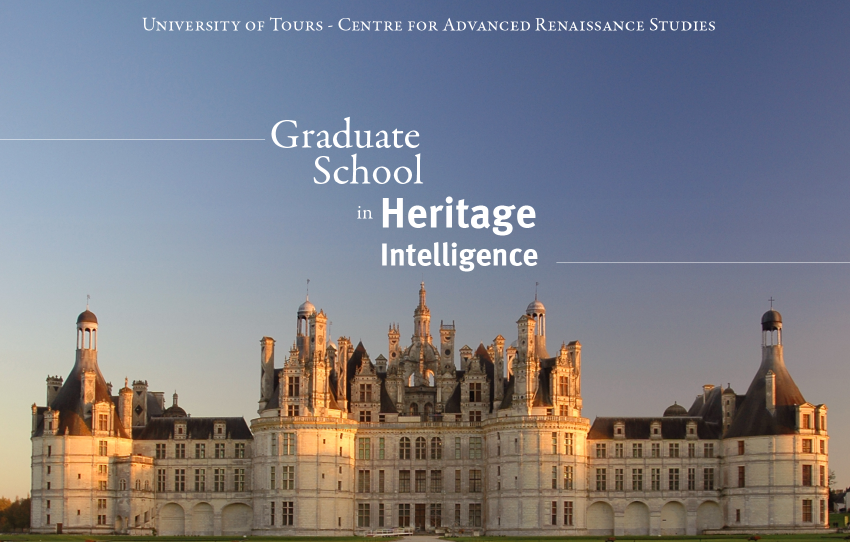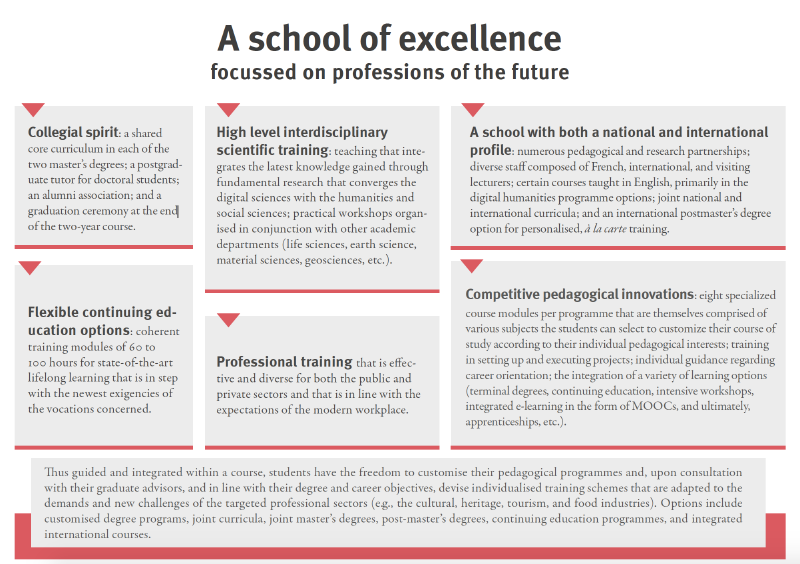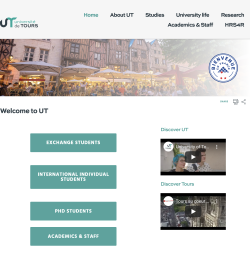Centre for Advanced Renaissance Studies: Graduate School in Heritage Intelligence

The Graduate School in Heritage Intelligence offers new, high-level professional and research training programmes on an original and unprecedented scale. With curricula poised at the crossroads where the humanities and social sciences meet the digital sciences, it prepares graduates for their master’s and doctoral degrees and integrates degree programmes with continuing education training.
The school offers two master’s degrees (the Master’s in History, Civilisation, and Cultural Heritage and the Master’s in Digital Humanities) with six programme options focussed on growing socio-economic sectors. Teaching is galvanized by transversal, interdisciplinary, and international research partnerships, including, for example, the Intelligence des Patrimoines (‘Heritage Intelligence’) initiative centred on cultural and natural heritage (winner of the Val-de-Loire Ambition Research Development 2020 award and comprising 34 research laboratories and over 360 researchers across the region) and the Pôle Alimentation (the University of Tours’s centre for food studies; consisting of some 100 researchers from Tours).
Our innovative collection of course options is coordinated by the Centre for Advanced Renaissance Studies (CESR), which is unique in France in that it is both an academic faculty (UFR) and an internationally recognised Joint Research Unit (UMR 7323), and which is under the triple administrative supervision of the University of Tours, the French National Scientific Research Centre (CNRS), and the Ministry of Culture (MIC). It also collaborates with two other research laboratories, one in archaeology (UMR CITERES-LAT) and one in digital technology (EA LIFAT), as well as several faculties of the University of Tours. And in addition it engages with a great many internal and external partners, both educational and professional, public and private, in France as well as abroad. Suited to a diverse audience with backgrounds typically in the humanities and social sciences and/or digitisation, it offers students the opportunity to learn new scientific methodologies, acquire cutting-edge fundamental and technological skills, and design projects for the workplace of the future.
> HISTORY, CIVILISATION, AND CULTURAL HERITAGE DEGREE PROGRAMMES
- Careers in Heritage Science
- Renaissance Cultures and Heritage
- Food Cultures and Heritage
- Careers in Archaeology and Digital Archaeology
> DIGITAL HUMANITIES DEGREE PROGRAMMES
> DOCTORATE
The School offers those holding master’s degrees the opportunity to complete their university curriculum by preparing for a doctorate in any of our offered fields of training. Regional and national three-year doctoral scholarships can be awarded depending on the number of places available and the result of a selection process. Depending on their area of specialisation, doctoral students are free to engage in the academic activities of our various partner research laboratories.
Students wishing to pursue a doctorate at the Graduate School in Heritage Intelligence are referred to one of the doctoral colleges at the University of Tours: Humanités et Langues; Sciences de la Société: Territoires, Économie, Droit; and Mathématiques, Informatique, Physique Théorique et Ingénierie des Systèmes.
The CESR currently hosts 58 doctoral students conducting research in one or more of the various disciplines taught.
Prospective students
The School is open to all students holding a bachelor’s or master’s degree, particularly humanities, social sciences and/or digital sciences graduates. Bringing together several advanced training programmes and cutting-edge research laboratories that have demonstrated their capacity for pedagogical, scientific and professional innovation, it prepares students for future vocations in key heritage, cultural, food and agricultural sectors as well as archaeology, tourism and digital technology, etc.Career opportunities
> Potential public and private sector careers include director, project manager, policy officer, design engineer, researcher or university lecturer, entrepreneur, heritage curator or mediator, and careers in audio-visual media and communications, etc.> The digital competencies that are central to our pedagogical and training programmes give our graduates and postgraduates a competitive edge in today’s job market.
> Similarly, the spirits of entrepreneurship and professional development are promoted through a compulsory career orientation course module (‘Élaborer son projet professionnel’) as well as through a dedicated university start-up incubator (Smart Tourisme Lab) that is closely connected to the School.

Présence d'un lecteur vidéo
Contacts
- Careers in Heritage Science - master.msp@univ-tours.fr
- Renaissance Cultures and Heritage - master.cpr@univ-tours.fr
- Food Cultures and Heritage - master.cpa@univ-tours.fr
- Careers in Archaeology and Digital Archaeology - master.m2a@univ-tours.fr
- Cultural Heritage and Data Science - master.idcp@univ-tours.fr
- Digital Mediation of Cultural Heritage - master.mncp@univ-tours.fr
Contact for further information:
Anna Matheson, International Relations and Erasmus Coordinator / CESR
anna.matheson@univ-tours.fr
> Discover the University of Tours
